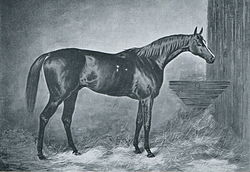- Doncaster (horse)
-
Doncaster 
Sire Stockwell Grandsire The Baron Dam Marigold (1860) Damsire Teddington[1] Sex Stallion Foaled 1870 Country Great Britain Colour Chestnut Breeder Sir Tatton Sykes Owner 1. Mr J. Merry; 2. Robert Peck 3. Duke of Westminster Trainer Robert Peck Record 10: 4 wins Earnings ₤4,825 (for the Derby) Major wins Epsom Derby (1873)
Goodwood Cup (1874)
Ascot Gold Cup (1875)Horse (Equus ferus caballus) Last updated on 21 February 2011 Doncaster (1870-January 1892) was an English Thoroughbred racehorse, winner of the Epsom Derby and sire of the great stallion Bend Or.
Contents
Breeding
Doncaster was foaled at the Sledmere Stud in Great Britain and was sired by "The Emperor of Stallions", Stockwell, who had won both the 2,000 Guineas and the St. Leger Stakes; Stockwell was a leading sire during his later years, producing many classic winners. Doncaster's dam Marigold had a fairly good career on the track, and was sired by the Epsom Derby winner Teddington.[2]
Doncaster, chestnut with a blaze and originally named All Heart and No Peel, was raised at the Sledmere Stud before he was sent to the Tattersalls auction. James Merry bought the colt for 950 guineas, changed his name to Doncaster (after the racetrack), and sent him to trainer Robert Peck.
Racing career
The colt did not compete as a two-year-old, partially due to a kick to the stifle. Doncaster began racing as a three-year-old, first appearing at the 2,000 Guineas (where he was unplaced to winner Gang Forward). He won his next race (the Derby) easily. He then raced in the Grand Prix in Paris, finishing third to winner Boiard, before being beaten by a head at the St. Leger. He did not do well in his next run, the Grand Duke Michael Stakes, but finished his season second in the Newmarket Derby.
His four-year-old career was respectable, with a dead heat second place with Flageolet in the Ascot Gold Cup (won by Boiard), before a win at the Goodwood Cup. As a five-year-old, he won both the Ascot Gold Cup and the Alexandra Plate; the races were two days apart.[2]
At stud
Doncaster was then retired. Peck purchased him for £10,000 and immediately selling the stallion to the Duke of Westminster (for whom he was also a trainer) for £14,000. The Duke had been searching for a stallion prospect, with a good pedigree and racing record, to stand at his Eaton Stud. Doncaster was bred to the mare Lily Agnes (by Macaroni), who produced the filly Farewell, a 1,000 Guineas winner. Doncaster's most famous son was Bend Or, the Derby winner and prolific sire. He also sired Sir Reuben and Cambusmore. Other noted offspring were:
- Muncaster: sired Saraband (broodmare sire of Pretty Polly), Lady Muncaster, and Lady Loverule (dam of 1904 Derby winner St. Amant).[3]
- Sandiway: won the Coronation Stakes at Royal Ascot; dam of only three foals, but influential in many American-bred horses (she was in the pedigree of Sting — sire of Dr. Fager – twice).
Empress Elisabeth of Austria saw Doncaster while visiting Eaton, and reportedly fell in love with him. She eventually purchased him, for £5,000, and he lived at her Kisber Stud until his death at the age of 22 in January 1892. His blood lives on through his son, Bend Or.[3]
Pedigree
Pedigree of Doncaster (5) chestnut stallion, 1870 Sire
Stockwell
Ch. 1849The Baron
Ch. 1842Birdcatcher Sir Hercules Guiccioli Echidna Economist Miss Pratt Pocahontas
B. 1837Glencoe Sultan Trampoline Marpessa Muley Clare Dam
Marigold
Ch. 1860Teddington
1848Orlando Touchstone Vulture Miss Twickenham Rockingham Electress Ratan mare Ratan Buzzard Picton Mare Melbourne Mare Melbourne Lisbeth (F-No.5-e)[2] See also
References
External links
Categories:- 1870 racehorse births
- 1892 racehorse deaths
- Thoroughbred racehorses
- Racehorses trained in the United Kingdom
- Racehorses bred in the United Kingdom
- Epsom Derby winners
Wikimedia Foundation. 2010.
